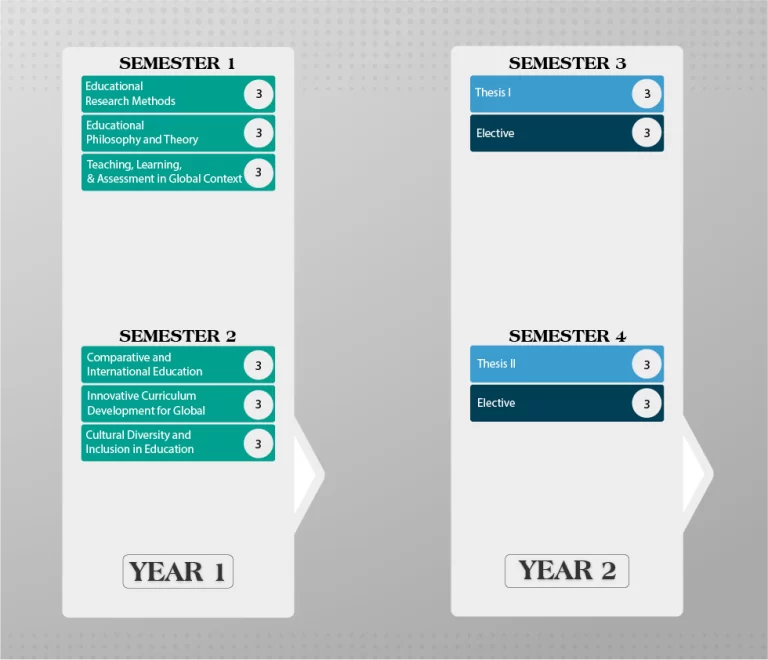Master of Education
Overview
The Master of Arts in Education at the American University in the Emirates (AUE) is designed to empower aspiring and practicing educators with the knowledge, skills, and mindset needed to lead and innovate in today’s diverse educational landscapes. This interdisciplinary program balances educational theory with practical application, preparing graduates to become reflective practitioners, effective leaders, and advocates for inclusive, student-centered learning environments.
Through a curriculum grounded in evidence-based practices and global perspectives, students will explore key topics such as curriculum design, educational leadership, assessment and evaluation, educational technology, and inclusive practices. The program supports both local and international educational priorities, equipping graduates with the tools to make a meaningful impact across schools, higher education institutions, and education-related organizations.
What Makes Our Program Unique
- Flexible Learning for Working Professionals: Courses are offered during evenings and weekends to accommodate educators, school leaders, and professionals with full-time commitments.
- Focus on Innovation & Leadership: Our curriculum emphasizes creativity, critical thinking, and leadership development to shape future-ready education professionals.
- Global Perspective in a Local Context: Located in Dubai, a global education hub, the program addresses regional educational challenges while preparing students to work in international settings.
- Diverse Learning Environment: AUE’s multicultural community enhances learning through cross-cultural exchange and collaborative projects.
Who Should Join This Program
- Current teachers seeking advanced knowledge and leadership roles in schools.
- Education professionals looking to transition into curriculum development, policymaking, or administrative positions.
- Graduates from other fields who aspire to enter the education sector with a strong theoretical and practical foundation.
- Individuals interested in advancing inclusive and equitable education practices.
1: Instill in students a thorough awareness of and comprehension of International trends in education to help them develop the critical thinking and international system comparison skills necessary for success.
2: Empower students to practice inclusive teaching strategies that honor cultural diversity and guarantee fair educational opportunities for every student.
3: Inspire students to create innovative curricula by including multicultural content, International viewpoints, and a knowledge of various teaching methodologies.
4: Equip students with the tools they need to use data wisely in order to make decisions in the classroom, encouraging ongoing development and evidence-based approaches.
5: Develop leadership abilities that will empower graduates to drive change, encourage teamwork, and overcome obstacles in multicultural learning contexts.
1. Acquire a comprehensive knowledge of international education systems to examine different models, highlighting unique characteristics and challenges.
2. Compare various international educational systems to identify key elements of international competence in curriculum design, and to construct curriculum frameworks that are culturally responsive and inclusive, integrating international perspectives and multicultural content.
3. Formulate approaches for incorporating Artificial Intelligence tools and techniques in an educational context to enhance learning experience and to predict future AI development in educational field.
4. Implement teaching strategies that are inclusive and responsive to diverse cultural needs, promoting a culture of continuous learning and improvement within educational settings.
5. Apply advanced research methodologies to effectively identify, critique, and address educational challenges and best practices in the educational landscape.
Graduates of the MA in Education program will be well-equipped for roles such as:
- School Leader or Principal
- Instructional Coordinator
- Curriculum Specialist
- Educational Consultant
- Policy Advisor in Education Ministries or NGOs
- Academic Advisor or Student Affairs Officer
- University Lecturer (with further qualifications)
- Education Technology Integrator
ADMISSION REQUIREMENTS
- A recognized undergraduate degree, typically in Education or a related field (e.g., Psychology, Social Sciences, Liberal Arts).
- Minimum CGPA 3.00 out of 4.00.
- All applicants who got less than 3.0 CGPA (but not less than 2.5) or its equivalent at their bachelor’s degree will be conditionally admitted to the university for one semester, where they can register no more than 9 CH of remedial courses and should achieve a CGPA of 3.0 in their first semester.
- A minimum of 6.0 on the IELTS or 79 on the TOEFL iBT or TOEFL ITP 550
- Applicants must attend an admissions interview with the Program Representative.
- Applicants are required to write a one-page (500-word) personal admissions statement in English.
PROGRAM STRUCTURE
Course Category
Total Number of Courses
Total Number of Credit Hours
Core Courses
6
18
Elective Courses
2
6
Thesis 1
1
3
Thesis 2
1
3
Total
30 Credit Hours
PROGRAM courses
CORE COURSES
6 COURSES | 18 CREDIT HOURS
Elective Courses
CHOOSE 2 COURSES | 6 CREDIT HOURS
This course offers an extensive exploration of international education policies and how they are created and put into action globally. Students will explore how international organizations along with governments and non-governmental organizations play a part in shaping policies. The focus of the class is on comparing and analyzing educational policies, discussing the challenges faced in transferring policies from one context to another and understanding how global trends in education impact national education systems.
This course navigates into leadership theories and change management strategies within the context of global education. It aims to develop leadership skills that are effective in diverse cultural settings. The course thoroughly examines strategies for leading and managing change in educational institutions, addressing global leadership challenges, effective communication across cultures, and practical techniques for implementing change. This course is pivotal for educational leaders aiming to navigate and influence the evolving global educational landscape effectively.
The course explores transforming educational institutions into dynamic entities. It expands upon the idea of how these organizations can evolve to be more responsive, creative, and perpetually enhance their teaching and administrative environments. The course rigorously examines various models and frameworks that define a learning organization, emphasizing the role of leadership in cultivating a culture that embraces change and innovation. It also explores how organizational culture and leadership practices can significantly influence learning outcomes and the effectiveness of educational practices. Furthermore, it provides practical insights into planning and implementing strategies that encourage ongoing development and growth within educational environments, making it an essential component for educators and administrators aiming to lead in the evolving landscape of global education.
The course explores the Artificial Intelligence (AI) fundamentals and its diverse applications in enhancing teaching, learning, and educational management. The course offers understanding of the theoretical foundation of AI in education, current applications of AI in education, advanced teaching, learning, and assessment AI tools, and the management of educational systems. Students will critically analyze ethical considerations, navigate the challenges of AI integration in education, and predict AI’s future potential and impact on the educational landscape.
THESIS
6 CREDIT HOURS
Program Director

Dr. Michael McIntosh
Associate Professor / Program Director of the Master of Education


